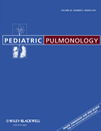The relationship between gastroesophageal reflux and cough in children with chronic unexplained cough using combined impedance–pH–manometry recordings
Abstract
Introduction
Assessment of the reflux–cough association in children is challenging. Esophageal (impedance) pH recording is sensitive to recognize reflux. However, cough recorded by an event marker, possibly lacks accuracy. We aimed to study the exact time relationship between reflux and cough in children with chronic cough.
Methods
Twenty-six children (12 boys; 1–10.5 years) with chronic unexplained cough underwent ambulatory impedance–pH–manometry recordings. Manometry was used for precise cough recognition. Reflux was assessed with impedance-pH monitoring and defined as acid (pH <4), weakly acidic (WA) (pH 4–7), weakly alkaline (WALK) (pH ≥7), or acid only (pH <4 for ≥4 sec without impedance pattern). Cough was considered “induced by” reflux, if it started ≤2 min after reflux. The Symptom Association Probability (SAP) was calculated and considered positive if >95%. Cough-induced reflux if it occurred 30 sec before the reflux event.
Results
Impedance-pH detected 30 (21–52) reflux episodes/patient (55.2% acid, 41.5% WA, and 3.3% WALK). Additionally 59 acid only events were identified [1 (0–21)/patient]. Manometry detected 47 (5–203) cough bursts/patient. Reflux–cough was found in 22/26 patients. Ten patients had a +SAP for reflux–cough (one acid, six WA, and three acid + WA gastroesophageal reflux [GER]), of which nine had a normal acid exposure. Six out of 10 patients with +SAP using manometry had a +SAP using the event marker. Cough–reflux was detected in 19 patients [3 (0–7)/patient]. Only a small fraction of the esophageal acid exposure [9.6 (0.4–31.8%)] was secondary to cough.
Conclusion
Both acid and WA GER may precede cough in children with unexplained cough, but cough does not induce GER. Objective cough recording improves symptom association analysis. Pediatr Pulmonol. 2011; 46:286–294. © 2011 Wiley-Liss, Inc.




